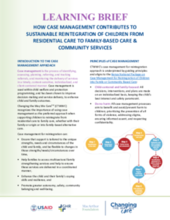Case management is the process of identifying, assessing, planning, referring, and tracking referrals, and monitoring the delivery of services in a timely, context-sensitive, individualized, and client-centered manner. Case management is used within child welfare and protection programming, and has been shown to improve decision-making and service delivery, to enhance child and family outcomes.
Changing the Way We CareSM (CTWWC) recognizes the importance of using case management as the preferred approach when supporting children to reintegrate from residential care to family care, whether with their family or origin or into family-based alternative care. Case management for reintegration can:
- Ensure that support is tailored to the unique strengths, needs and circumstances of the child and family, and be flexible to changes in those strengths/needs/circumstances over time,
- Help families to access multisectoral family strengthening services and help to ensure these services are delivered in a coordinated manner,
- Enhance the child and their family’s coping skills and resilience, and
- Promote greater autonomy, safety, community belonging and well-being.
In 2022, after three years of implementing case management for reintegration, CTWWC conducted participatory reflection sessions with caseworkers across three demonstration counties in Kenya to answer a primary learning question, “How does case management contribute to sustainable reintegration of children from residential care institutions?” The reflection sessions explored caseworkers’ experiences using the case management tools, children and families’ experiences of reintegration, and the most significant changes that caseworkers had observed in their own practice, as well as changes in children and families.
This learning brief reports on the reflection and shares a collection of case studies collated by caseworkers in Kenya. Using Most Significant Change Storytelling, the caseworkers, supervisors and program managers selected and discussed stories from their work. They discussed what lessons these stories and the discussion drew out about the case management practice. The each of the stories illustrates one or more of the case management steps.

